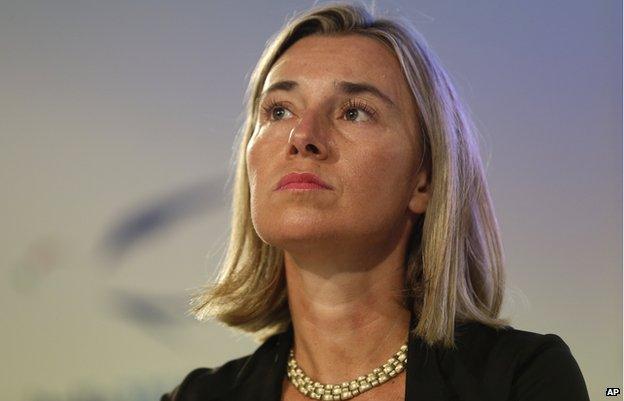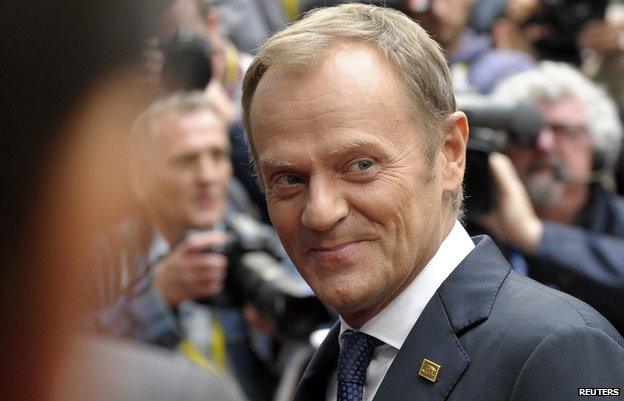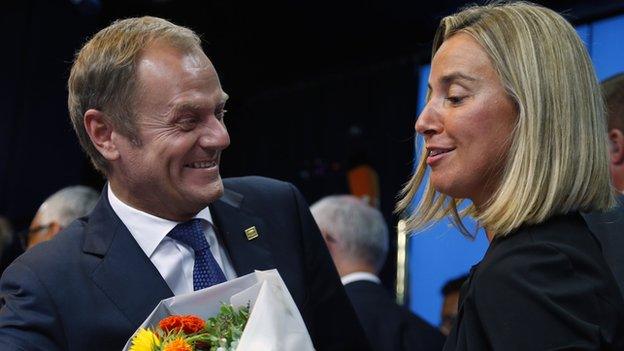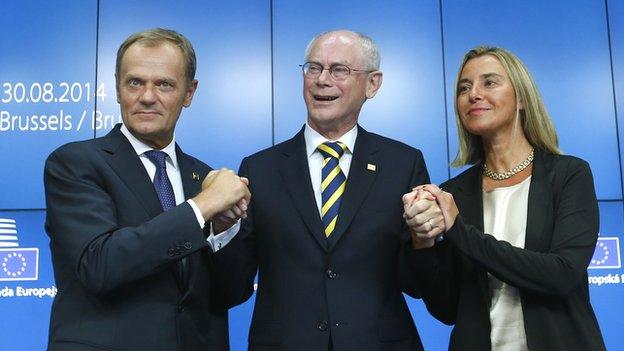Mogherini and Tusk: New faces at the top of the EU
- Published
EU leaders have appointed an Italian and a Pole to two top jobs in the 28-member bloc.
Italy's Foreign Minister Federica Mogherini, a centre-left politician, is the new EU foreign affairs chief, replacing Catherine Ashton. Officially her title is EU High Representative. The European Parliament is expected to approve the appointment.
Poland's centre-right Prime Minister Donald Tusk is the choice for European Council president, replacing the Belgian Herman Van Rompuy. The job involves setting the EU's broad priorities, chairing EU summits and forging agreement among often divided EU member states.

Federica Mogherini

Ms Mogherini, 41, has only been Italian foreign minister since February.
Italy's Prime Minister Matteo Renzi lobbied hard to get her accepted as the new EU foreign affairs chief. But he met with resistance at an EU summit in July, when East European leaders objected to her relative lack of experience and alleged soft stance towards Russia.
But at the EU summit on Saturday Mr Van Rompuy said EU leaders were convinced that Ms Mogherini would be a successful negotiator for Europe internationally.
Ms Mogherini, speaking fluent English, said that "the challenges are huge... all around Europe we have crises - on European soil, in Ukraine, and starting from Iraq and Syria, going to Libya".
She graduated in political science from Sapienza University in Rome - her home city - and also wrote a thesis on Islamism.
She was elected to parliament for the first time in 2008 and specialised in foreign affairs. She is known to be very loyal to Mr Renzi.
"Even when she was 25, she was focused on foreign policy," said Luca Bader, a Democratic Party colleague quoted by Reuters news agency. "She's very sober and serious, not picturesque or colourful."
She will run the EU External Action Service (EEAS) and spend much of her time travelling the globe, dealing with issues as diverse as the Ukraine conflict, Iran's controversial nuclear programme and the threat posed by Islamist militants in the Middle East.
Like Catherine Ashton, she was chosen in preference to some veteran foreign policy big-hitters, notably Poland's Radek Sikorski, Lithuania's President Dalia Grybauskaite and Sweden's Carl Bildt. So Europe's foreign ministries will be scrutinising her actions and speeches closely.
According to Jan Techau, director of the Carnegie Europe think-tank, "not just her knowledge base has been questioned, but also whether she has enough gravitas to be the senior diplomat".
EU governments tend to keep a firm grip on foreign policy, paying lip service to the ideal of a "single EU voice" internationally.
"As high representative you're essentially an employee of the member states. They always fear someone who sets an agenda - they don't want someone overambitious," Mr Techau told the BBC.

Donald Tusk

Mr Tusk, 57, got firm backing from Germany's Chancellor Angela Merkel and UK Prime Minister David Cameron for the council presidency job.
His government has been one of the toughest in the EU in demanding sanctions against Russia over Moscow's support for the uprising in eastern Ukraine.
The crisis in Ukraine - widely seen as Europe's biggest security challenge since the Cold War - will put his leadership to the test. His poor spoken English is seen as a possible handicap.
In January his government clashed with Mr Cameron over the UK leader's desire to curb child benefit payments for EU migrants.
Nevertheless, Mr Cameron appears to see him as a potential ally in the UK's drive for fundamental EU reform.
Mr Tusk has been prime minister since 2007 and in 2011 he became the first Polish PM to be re-elected since the fall of communism in 1989.
He hails from Gdansk, the Baltic port city where anti-communist demonstrations, led by the Solidarity trade union, erupted in the 1980s. He was active in Solidarity while studying history at the University of Gdansk.
He is from Poland's Kashubian minority.
He leads Civic Platform (PO), which espouses free market policies. His government has cut jobs in the state sector, pursued privatisation, cut taxes to woo foreign investors and tried to persuade Poles abroad to come home.
Poland, unlike many of its richer EU partners, has enjoyed steady economic growth despite the impact of the global financial crisis.
- Published30 August 2014

- Published30 August 2014
